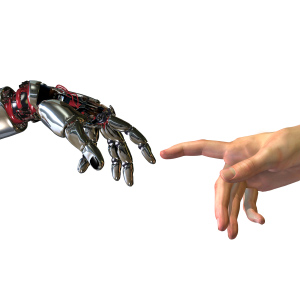
From the T-101 to Data from Star Trek, humans have been presented with the fictional dilemma of how we empathise with robots. Robots now infiltrate our lives, but how do we really feel about these non-sentient objects on a human level?
A recent study by researchers at the University of Duisburg Essen in Germany found that humans have similar brain function when shown images of affection and violence being inflicted on robots and humans.
Astrid Rosenthal-von der Pütten, Nicole Krämer, and Matthias Brand of the University of Duisburg Essen, will present their findings at the 63rd Annual International Communication Association conference in London. Rosenthal-von der Pütten, Krämer and Brand conducted two studies.
How the study was done
In the first study, 40 participants watched videos of a small dinosaur-shaped robot that was treated in an affectionate or a violent way and measured their level of physiological arousal and asked for their emotional state directly after the videos. Participants reported to feel more negative watching the robot being abused and showed higher arousal during the negative video.
The second study conducted in collaboration with the Erwin L. Hahn Institute for Magnetic Resonance Imaging in Essen, used functional magnetic-resonance imaging (fMRI), to investigate potential brain correlations of human-robot interaction in contrast to human-human interaction.
The 14 participants were presented videos showing a human, a robot and an inanimate object, again being treated in either an affectionate or in a violent way. Affectionate interaction towards both, the robot and the human, resulted in similar neural activation patterns in classic limbic structures, indicating that they elicit similar emotional reactions.
However, when comparing only the videos showing abusive behaviour differences in neural activity suggested that participants show more negative empathetic concern for the human in the abuse condition.
A great deal of research in the field of human-robot interaction concentrates on the implementation of emotion models in robotic systems. These studies test implementations with regard to their believability and naturalness, their positive influence on participants, or enjoyment of the interaction. But there is little known on how people perceive "robotic" emotion and whether they react emotionally towards robots.
People often have problems verbalising their emotional state or find it strange to report on their emotions in human-robot interactions. Rosenthal-von der Pütten and Krämer's study utilised more objective measures linked to emotion like physiological arousal and brain activity associated with emotional processing.
Relationships with robots
"One goal of current robotics research is to develop robotic companions that establish a long-term relationship with a human user, because robot companions can be useful and beneficial tools. They could assist elderly people in daily tasks and enable them to live longer autonomously in their homes, help disabled people in their environments, or keep patients engaged during the rehabilitation process," said Rosenthal-von der Pütten.
"A common problem is that a new technology is exciting at the beginning, but this effect wears off especially when it comes to tasks like boring and repetitive exercise in rehabilitation. The development and implementation of uniquely humanlike abilities in robots like theory of mind, emotion and empathy is considered to have the potential to solve this dilemma."




 Publications
Publications
 Partners
Partners













